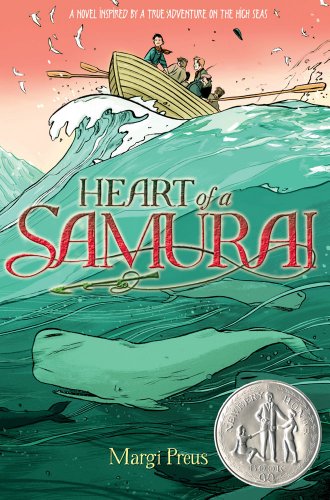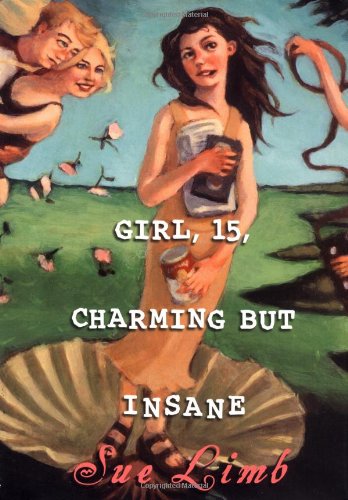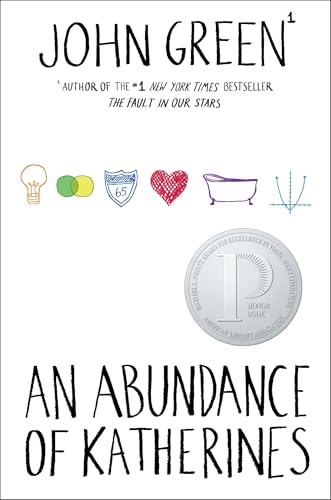 Heart of a Samurai starts strong. Seriously, by the second page, the fishermen are adrift in the Pacific Ocean with little hope of survival. By page twenty, rescue from their rocky island is imminent and comes in the form of an American whaling ship. From there, they are on a sea journey as viewed through the eyes of a fourteen-year-old Japanese boy. His isolation and views of the foreigners as “barbarians” add to the feeling of discovery for him and for the reader. It’s all going swimmingly, one might say, until the story takes some time off in America.
Heart of a Samurai starts strong. Seriously, by the second page, the fishermen are adrift in the Pacific Ocean with little hope of survival. By page twenty, rescue from their rocky island is imminent and comes in the form of an American whaling ship. From there, they are on a sea journey as viewed through the eyes of a fourteen-year-old Japanese boy. His isolation and views of the foreigners as “barbarians” add to the feeling of discovery for him and for the reader. It’s all going swimmingly, one might say, until the story takes some time off in America.At this point the novel slows down to a crawl. What was a sea adventure becomes a tale of acclimation. We’ve gone from The Perfect Storm to Little House on the Prairie. There’s some good stuff in this section that shows the difference between the acceptance that John Mung found on the ship with the prejudice of the farming community. As the real Mung’s history, it’s important to understand his intelligence, his loyalty, and his isolation. But as a novel, this section dashes the growing momentum of the story. By the time he gets back on a whaling boat, we have a better sense of both his reasoning and his sacrifice in making the decision, but we’ve lost the excitement.
Unfortunately, this turn on the whaling ship is short and goes into a series of various real-life activities that eventually get Mung back to Japan and set him on his adult course as an ambassador between countries and an actual samurai. Interesting stuff from a historical perspective, but a complete switch in style. Also, by this point in the book Mung is an adult, not a child or teen, so the story loses much of its appeal as children’s literature. There are great nonfiction resources — historical notes, a glossary, a bibliography, and actual drawings of John Mung throughout the book — but again, weren’t we signing on for a sea adventure?
Overall, I liked the book but think it would have benefited as a novel from less exacting reliance on the historical events. Get that kid back on the boat much faster and end with his last whaling journey. Perhaps he could be staring out over the ocean towards him homeland knowing in his heart that he’ll make it home someday, leaving the rest of the story for the epilogue.
So what do you think about it?
Links to material on Amazon.com contained within this post may be affiliate links for the Amazon Associates program, for which this site may receive a referral fee.
























8 comments:
I thought this one was slow. I struggled to get through it--if it hadn't gotten an honor, I don't think I would have bothered.
I enjoyed the beginning of the book, but once the story was back on land it kind of fell flat for me. Overall I enjoyed reading it, but I probably would not have picked it up had it not won and honor. This is another book that is likely to sit on my shelves and rarely get checked out.
I agree that this one dragged in places, but I think I would have been much happier if I hadn't been expecting "adventure on the high seas" to begin with.
i couldn't finish it. i put it down after i read about a whale being killed and slaughtered. i am WAY too sensitive.
Oddly, this one I liked. The beginning sea journey enticed me, but I found his life in the US oddly interesting. I'm buying one for my library because I have a couple of readers who area addicted to Paul Dowswell's Powder Monkey series, and I think they will like this.
I found the middle a little draggy too but I actually enjoyed the end. I'm pairing this one with Shipwrecked: The True Adventures of a Japanese boy for the Historical Fiction/Biography reading the sixth graders do.
I liked this one better than Moon over Manifest but many of my students didn't like either...
Like Tess, the description of the whale hunting/butchering reeeally bothered me too. I think that discomfort colored the rest of the book for me, so I could never really get into it.
I loved this book. It was based on a true story which really shocked me. There was always a promblem or adventure. I was never bored.
Post a Comment